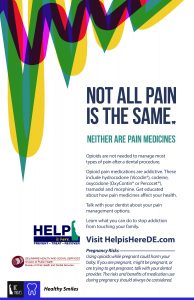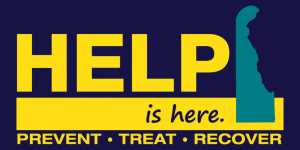The Delaware Department of Health and Social Services (DHSS) and Partnership for Drug-Free Kids are collaborating to bring dedicated, science-based resources and support to Delaware families. The two entities will work together to provide innovative, digital resources and one-on-one support to parents and caregivers as they help a loved one struggling with opioids or other substances.
With 192 overdose deaths occurring in the U.S. every day, underscored by a vast majority of people unable to access treatment, the combined effort between DHSS and Partnership for Drug-Free Kids aims to be a vital part of an integrated solution to affect statewide change.
In 2017, Delaware ranked sixth in the nation in drug overdose death rates, with most of these deaths directly linked to opioids, including heroin, prescription opioids and fentanyl, a synthetic opioid that is 50 times more powerful than heroin. Last year alone, Delaware lost 400 lives to overdose, marking an increase of 16% in overdose deaths from 2017 – and almost 3 in 4 of those deaths involved fentanyl.
“With thousands of Delawareans and their families continuing to be impacted by the disease of addiction, we need collaborations like this one with Partnership for Drug-Free Kids to offer critical support for parents and other caregivers,” said DHSS Secretary Dr. Kara Odom Walker, a board-certified and practicing family physician. “We need to listen to the challenges that families face and help them find a path to recovery for their loved ones.”
“We are honored to partner with the Delaware Department of Health and Social Services on this important project that will help close a gap in desperately needed support for Delaware families,” said Marcia Lee Taylor, Executive Vice President, External and Government Relations at Partnership for Drug-Free Kids. “Delaware has proven to be at the forefront of finding and adopting solutions to help those impacted by addiction. We are grateful to collaborate with a like-minded partner that understands the importance of bringing together a national family service infrastructure, coupled with local expertise and resources to make sure that more Delawareans get the help they need.”

This collaboration will be comprised of:
• A co-branded landing page tailored for Delaware families with resources, help and support.
• A dedicated Helpline for Delaware families (855-DRUG-FREE), where parents and other caregivers can connect with Parent Support Specialists who can listen to families’ challenges and help them develop an action plan that will help their child work toward recovery. Specialists will also be able to speak to state-specific issues like getting their loved one connected to treatment services through the START Initiative, finding needed clinical support through the Division of Substance Abuse and Mental Health’s Bridge Clinic, exploring treatment and recovery services at HelpIsHereDE.com, learning where naloxone is available and finding out how Delaware’s Good Samaritan Law works.
• Public service announcements (broadcast, radio, print and digital) to run in donated, pro-bono space thanks to the generosity of Delaware media.
“I’m pleased that families in Delaware will benefit from these best-in-class resources,” said Delaware Governor John Carney. “Across our state, I’ve heard from so many parents who are struggling to make that initial treatment connection for their adult children. Being able to provide parents with valuable, supportive and free resources will make a difference in their families’ lives.”
Josette Manning, Secretary of the Delaware Department of Services for Children, Youth and Their Families said, “We see the impact of substance use in families across the lifespan, from substance-exposed infants to parents and grandparents struggling with addiction. We welcome any partnership that increases prevention efforts and treatment opportunities so our families can achieve positive outcomes.”
The collaboration between Partnership for Drug-Free Kids, DHSS and the Delaware Department of Services for Children, Youth and Their Families (DSCYF) complements ongoing work to increase treatment and recovery services, reduce harm and expand prevention efforts by DHSS’ Division of Substance Abuse and Mental and Division of Public Health, and by the Behavioral Health Consortium, chaired by Delaware Lt. Governor Bethany Hall-Long. The Division of Substance Abuse and Mental Health (DSAMH) has partnered with atTAcK addiction, a grassroots advocacy group led by parents impacted by addiction, and the National Alliance on Mental Illness (NAMI) Delaware to train parents and other adults to handle Helpline calls.
“When I discovered that my son was struggling with heroin addiction, I didn’t know where to turn, or how to go about finding help for him. I never felt as helpless, hopeless and ashamed as I did during that time in my life,” said Belinda Wilson, a North Wilmington mom whose son is in now in recovery. “Finally, I was able to get my son the help he needed, but I realized I also needed support for my own self-care so that I would have the emotional and physical strength required to continue to help my son. Bringing these necessary resources to our state will help so many other families in Delaware, families like mine, have better outcomes for their loved ones who are struggling with substance use.”
For more information, visit https://drugfree.org/delaware.
 la who were receiving treatment for substance use disorder can contact DSAMH’s Mobile Crisis Helpline for Kent and Sussex counties at 1-800-345-6785 to get connected to new treatment services. Patients seeking to access additional supportive services including detoxification, recovery support, and recovery living, can visit Help Is Here at:
la who were receiving treatment for substance use disorder can contact DSAMH’s Mobile Crisis Helpline for Kent and Sussex counties at 1-800-345-6785 to get connected to new treatment services. Patients seeking to access additional supportive services including detoxification, recovery support, and recovery living, can visit Help Is Here at:
